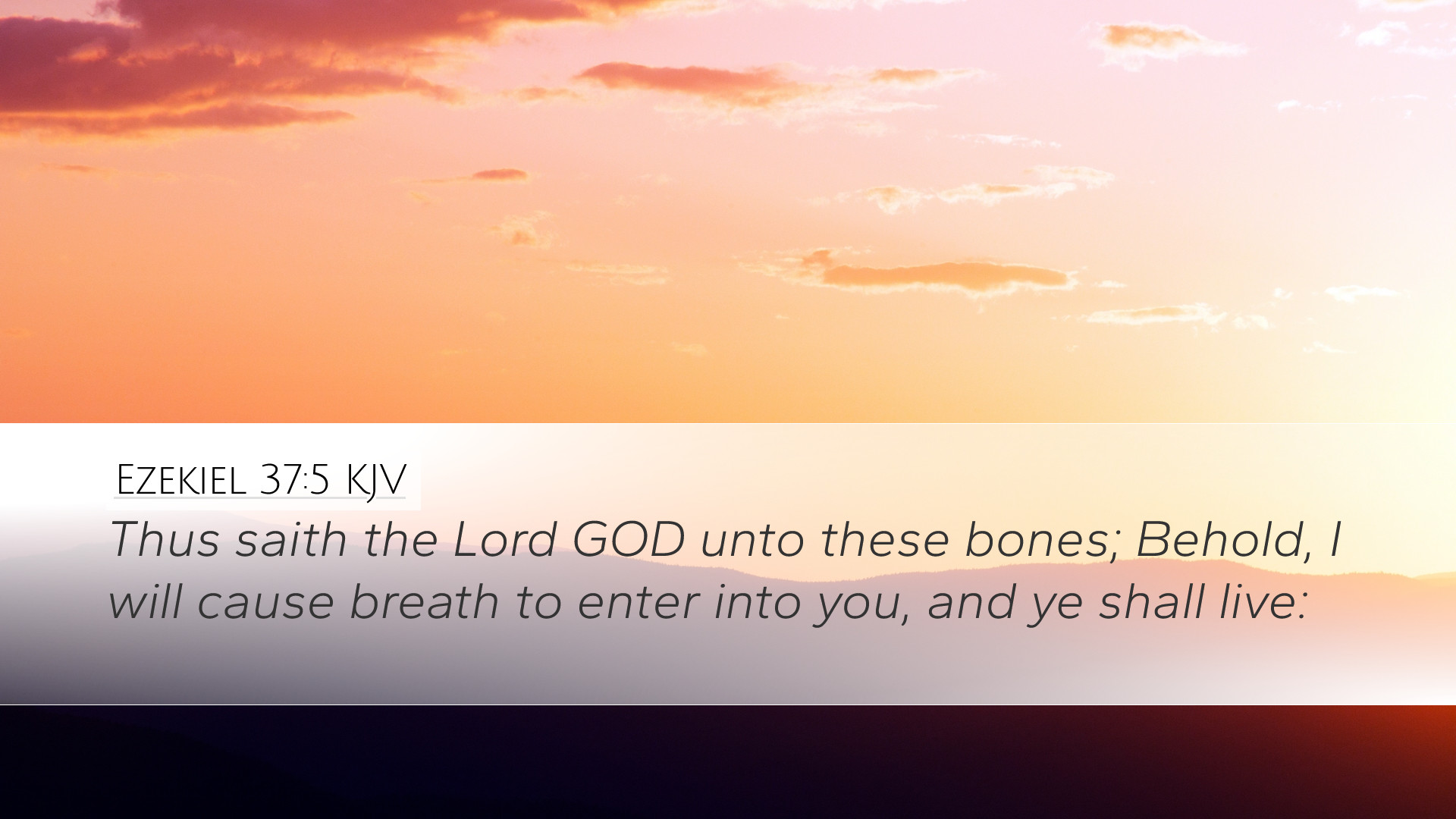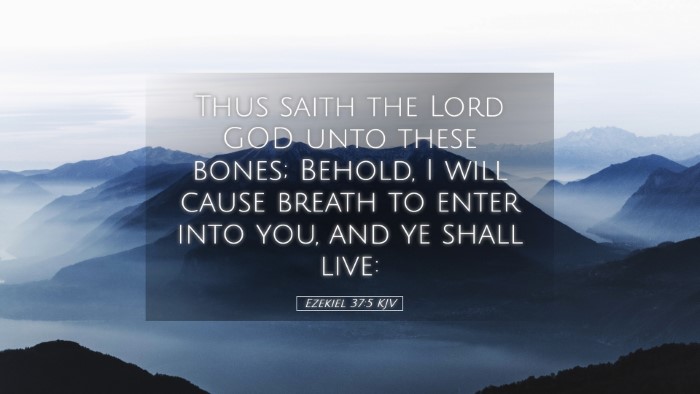Ezekiel 37:5 - A Commentary
Text of the Verse: "Thus says the Lord God to these bones: Behold, I will cause breath to enter you, and you shall live."
Introduction
The vision of the valley of dry bones, found in Ezekiel 37, is a profound metaphor for the revival of Israel. This specific verse highlights God’s promise to restore life where there was none. The implications of this resurrection touch on theological themes of hope, restoration, and divine sovereignty.
Commentary by Matthew Henry
Matthew Henry provides rich insights into the significance of the phrase "these bones." He emphasizes that the dry bones symbolize the entirety of the house of Israel, illustrating their state of desolation. Henry remarks on the hopelessness of Israel’s situation, noting that they had been scattered and abandoned. However, God’s proclamation serves as a reminder of His sovereign power to bring life from death.
Henry explains that the command to “cause breath to enter” signifies not just physical revitalization, but spiritual awakening. The breath, representing the Spirit of God, is essential for true life and restoration. Thus, God’s word brings transformation, illustrating the principle that nothing is too difficult for the Lord.
Commentary by Albert Barnes
Albert Barnes focuses on the implications of God's assurance of life. He notes that the resurrection of these bones illustrates a future hope for the nation of Israel. Barnes emphasizes God’s initiative in the restoration process, highlighted by the phrase "I will cause." This underscores the notion that redemption is fundamentally an act of grace initiated by God.
Moreover, Barnes discusses the theological implications of this resurrection. He connects this moment to a broader eschatological hope, suggesting that this prophecy foreshadows the ultimate resurrection that believers will experience. In this light, the promise to these bones can be seen as applying to all who are spiritually dead, offering reassurance of the new life found in Christ.
Commentary by Adam Clarke
Adam Clarke takes a somewhat practical approach, examining the context in which Ezekiel delivers this prophecy. He understands God’s words as not only aimed at Israel in exile but as a universal promise applicable to all situations of despair. Clarke highlights the necessity of recognizing our own dry bones—situations where hope seems lost—and invites readers to consider how God's breath can reinvigorate these circumstances.
Clarke also elaborates on the significance of "breath." He draws a parallel with the creation narrative, where God breathed life into Adam. This illustrates the consistent theme of God’s life-giving action throughout scripture, emphasizing the continuity of God’s redemptive work. Clarke urges readers to see that even the most desolate situations can be revitalized through God’s intervention and the power of His word.
Theological Reflections
This verse encapsulates several key theological themes relevant to pastors, students, theologians, and Bible scholars:
- Divine Sovereignty: The verse affirms God’s ultimate authority over life and death, illustrating that His intentions cannot be thwarted by human circumstances.
- Hope and Restoration: The promise of revival serves not only as a historical reference for Israel but also as a hopeful proclamation to all who find themselves in spiritual desolation.
- The Spirit’s Role: The need for breath highlights the necessity of the Holy Spirit in bringing spiritual renewal and vitality.
- Eschatological Significance: This verse points to the larger narrative of resurrection, as it prefigures the future hope found in Christ’s resurrection and the final resurrection of believers.
Practical Applications for Today
The implications of Ezekiel 37:5 extend beyond theological reflections to practical applications:
- Encouragement in Evangelism: Just as God can bring life to dry bones, believers are reminded that no one is beyond the reach of God’s saving grace.
- Hope in Despair: This verse serves as a source of encouragement for those in difficult situations, assuring them of God’s power to bring about change and renewal.
- Community Restoration: Churches can draw insights from this passage when considering their role in serving and reviving the community around them, advocating for spiritual and social renewal.
Conclusion
Ezekiel 37:5 stands as a powerful proclamation of God’s ability to bring life from death. Through the collective insights of Matthew Henry, Albert Barnes, and Adam Clarke, we glean a deeper understanding of the text’s implications for Israel and for believers today. The promise of revival is not only a physical restoration of a nation but a spiritual awakening for all who may feel spiritually dry. As we study this passage, may we be reminded of God’s sovereign power, the transformative work of the Spirit, and the hope that springs from His words.


